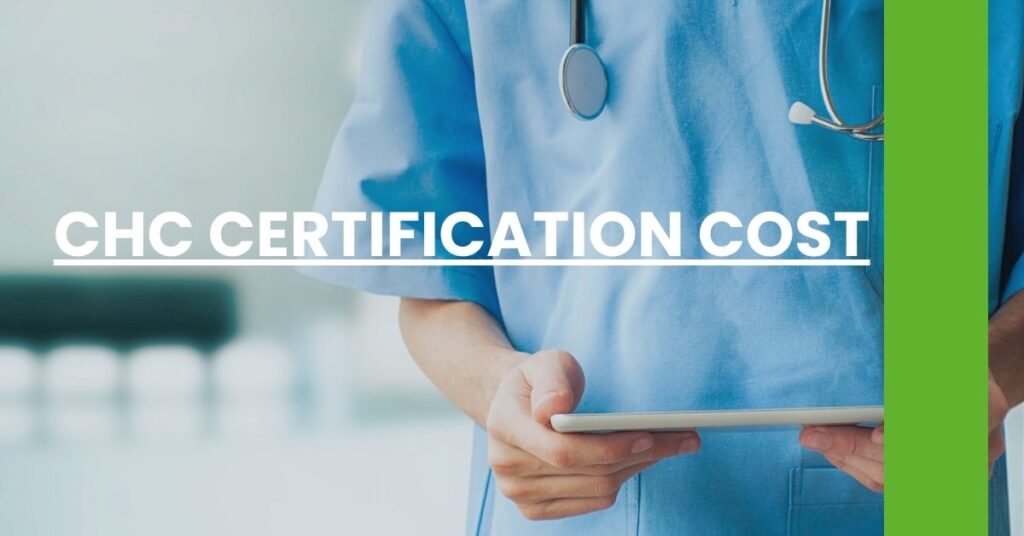The cost of obtaining CHC Certification typically includes exam fees, which are around $450 for non-members and $350 for members, plus expenses for study materials and potentially preparatory courses. Maintaining your certification will involve additional fees for renewal and continuing education.
In this guide, here’s what you can expect:
- Exam Fees: Understand the specific costs for taking the CHC exam.
- Study Resources and Courses: Explore the investment in study guides and training.
- Financial Aid: Discover options that can help offset the certification costs.
Read on to get a complete picture of the CHC Certification cost, ensuring you’re financially prepared to enhance your career in healthcare compliance.
Introduction
Embarking on the journey to become a Certified Healthcare Compliance (CHC) professional is a commendable decision that demonstrates your commitment to excellence and ethical standards in the healthcare industry. This certification not only validates your expertise but also opens doors to advanced career opportunities. However, one of the first considerations you will encounter is the cost associated with achieving and maintaining this prestigious credential. Understanding the CHC certification cost in detail will help you plan and budget accordingly, ensuring that the investment in your professional future is well-informed and strategically executed.
What Is CHC Certification?
At its core, the CHC certification is a mark of distinction for compliance professionals in the healthcare field. Administered by the Health Care Compliance Association (HCCA), this certification is recognized across the industry and confirms that you possess the necessary knowledge and skills to effectively navigate the complex landscape of healthcare regulations and compliance issues.
To be eligible for the CHC examination, you need to meet specific criteria including educational background, work experience, and continuing education in compliance. The exam itself covers a range of topics, from compliance program management to risk assessment, ensuring you’re well-equipped to handle the breadth of issues compliance officers face daily.
The CHC designation can be a pivotal point in your career, often leading to increased recognition from your peers, employers, and the industry at large. With the commitment to ongoing education that the certification embodies, you are essentially signaling to the world that you are dedicated to staying at the forefront of compliance best practices.
Benefits of CHC Certification
Why invest in CHC certification? The answer lies in the multitude of benefits that come with being a certified professional. Firstly, it sets you apart in a competitive job market. Employers recognize the value of a CHC credential as it signifies a professional’s commitment to maintaining the highest standards of conduct and staying updated with regulatory changes.
The benefits also extend beyond personal recognition; your certification can enhance the credibility of your organization’s compliance program, potentially mitigating legal issues and fostering a culture of compliance. Moreover, it can lead to a more robust professional network, as you join a community of certified practitioners sharing insights and advancing the field together.
In essence, CHC certification equates to an investment in your long-term career trajectory, an investment that can yield dividends in the form of career growth, professional development, and personal satisfaction.
Components of CHC Certification Cost
When mapping out the CHC certification cost, you’ll find that this is not a single expense but rather an amalgamation of various components. Each element contributes to the overall investment, serving a unique purpose in your journey towards certification.
Examination Fees: The baseline cost is tied to the examination itself. There are fees to sit for the exam, and these can vary based on membership status with HCCA.
Study Materials: Preparing for the exam means investing in a range of study materials. While some are available for free, others, such as official study guides and textbooks, represent an additional cost.
Preparatory Courses: Various preparatory courses and workshops exist to aid candidates. These can be particularly beneficial and vary in cost based on the provider and length of the course.
Membership Dues: While holding a membership with HCCA is not compulsory, being a member can offer discounts on exam fees and access to valuable resources.
Understanding these components is crucial as you plan financially for your certification. It pays to remember that beyond these direct costs, indirect expenses such as your time and potential travel for exam sitting or courses must also be considered.
Exam Fees and Associated Costs
The examination fee is the most direct cost associated with obtaining your CHC. The cost for members of HCCA stands at $375, while non-members will need to budget $525. This difference underscores the benefit of membership, not only for exam fee discounts but also for the network and resources that come with being part of a professional association.
However, the exam fee is not the end of the financial journey. It’s prudent to factor in additional costs such as:
- Membership Dues: If you choose to become a member of HCCA, annual dues will be a part of your ongoing expenses.
- Rescheduling Fees: Should you need to postpone your exam, a rescheduling fee will apply.
- Retake Fees: If you don’t pass the exam on the first attempt, retaking it will incur another fee.
Keep in mind that maintaining your certification will also involve costs down the road, as you’ll need to meet continuing education requirements and pay renewal fees. Investing in the exam and its related costs, though potentially substantial, is an investment in yourself, one that can lead to career security and advancement.
As you immerse yourself in preparing for the examination, remember that your approach should not only include budgeting for the financial cost but also investing in the appropriate study resources to ensure your success—a topic we’ll delve into next.
Study Materials and Resources
When preparing for your CHC certification, the adage “knowledge is power” couldn’t be more apt. Investing in the right study materials and resources is crucial to your success. While the cost of study materials can add to the total chc certification cost, it’s a fundamental part of the preparation process.
You have several options to choose from:
- Official Study Guides: These are tailored to the CHC examination and provide a clear outline of the topics covered. The HCCA’s official CHC study guide is a popular choice, though prices can vary.
- Textbooks: Comprehensive healthcare compliance texts can serve as valuable resources. Prices vary, so it’s worth shopping around.
- Online Materials: Free online resources can supplement your study, but be cautious to use reliable and up-to-date content.
- Flash Cards: For those who prefer bite-sized learning, flashcards can be an effective tool, available for purchase or through free online platforms.
You can also consider joining study groups or engaging in discussion forums for peer support and shared resources. Remember, while the upfront cost of these materials may seem high, their value in helping you pass the exam is immeasurable.
Training and Preparatory Courses
Beyond self-study, formal training and preparatory courses represent a significant portion of the chc certification cost. These structured learning environments offer comprehensive instruction and are often taught by industry experts.
- Live Seminars: Interactive and immersive, seminars allow for real-time feedback and networking.
- Online Courses: Flexible and often self-paced, online courses enable you to study around your schedule.
- Workshops: Intensive and focused, workshops provide the hands-on experience that can be crucial for understanding complex concepts.
While these courses may represent a higher cost, ranging from a few hundred to over a thousand dollars, they can be instrumental in ensuring your readiness for the exam. Evaluate your learning style and budget to determine if this investment is right for you.
Renewal and Maintenance Costs
Once you have achieved your CHC certification, your endeavor does not end. The certification requires renewal every two years. Renewal fees for members are $125 and $295 for non-members, added to the HCCA membership cost if you choose to maintain it.
Additionally, you are required to earn Continuing Education Units (CEUs) to maintain your certification, which can come with various costs:
- Educational Events: Conferences, seminars, or webinars may require registration fees.
- Online Courses: These often have fees, but can be a convenient way to earn CEUs.
- Publications and Research: Subscriptions to industry journals or purchase of books might be necessary.
The good news is that these expenditures not only contribute to the renewal of your certification but also to your ongoing professional development.
Financial Assistance and Scholarships
The overall chc certification cost might feel overwhelming, but assistance is available. Some employers offer tuition assistance programs, recognizing the value of a certified compliance staff. Additionally, scholarships or grants might be available through professional organizations or education institutions.
Explore options such as Emergency Financial Assistance Grants, which while not specific to CHC certification, provide an example of how candidates in similar certification tracks find support. Check with the Compliance Certification Board and HCCA for opportunities that may alleviate the financial burden.
Additional Considerations
It’s important to keep in mind potential hidden costs when calculating your chc certification cost. Are you traveling to take the exam or attend a preparatory course? Don’t overlook expenses such as:
- Travel: Flights, ground transportation, and accommodations.
- Meals: Daily dining while attending courses or exams.
- Time Off Work: If applicable, the cost of unpaid leave for study and exam days.
These indirect costs are often forgotten in the planning process but can impact your budget considerably. Always aim to account for all possible expenses for the most accurate financial planning.
Conclusion
Achieving your CHC certification is a testament to your dedication to the field of healthcare compliance. As we’ve seen, this process involves various costs, from exam fees and study materials to renewing and maintaining your professional status. Remember, the chc certification cost is not merely an expense but an investment in your career, one that can lead to increased recognition, career advancement, and personal growth.
As a certified healthcare compliance professional, the value you bring to your organization and the industry will be recognized and, very likely, rewarded. So, take the first step in this transformative journey today, and be conscious that every dollar spent is building towards a brighter professional future.

